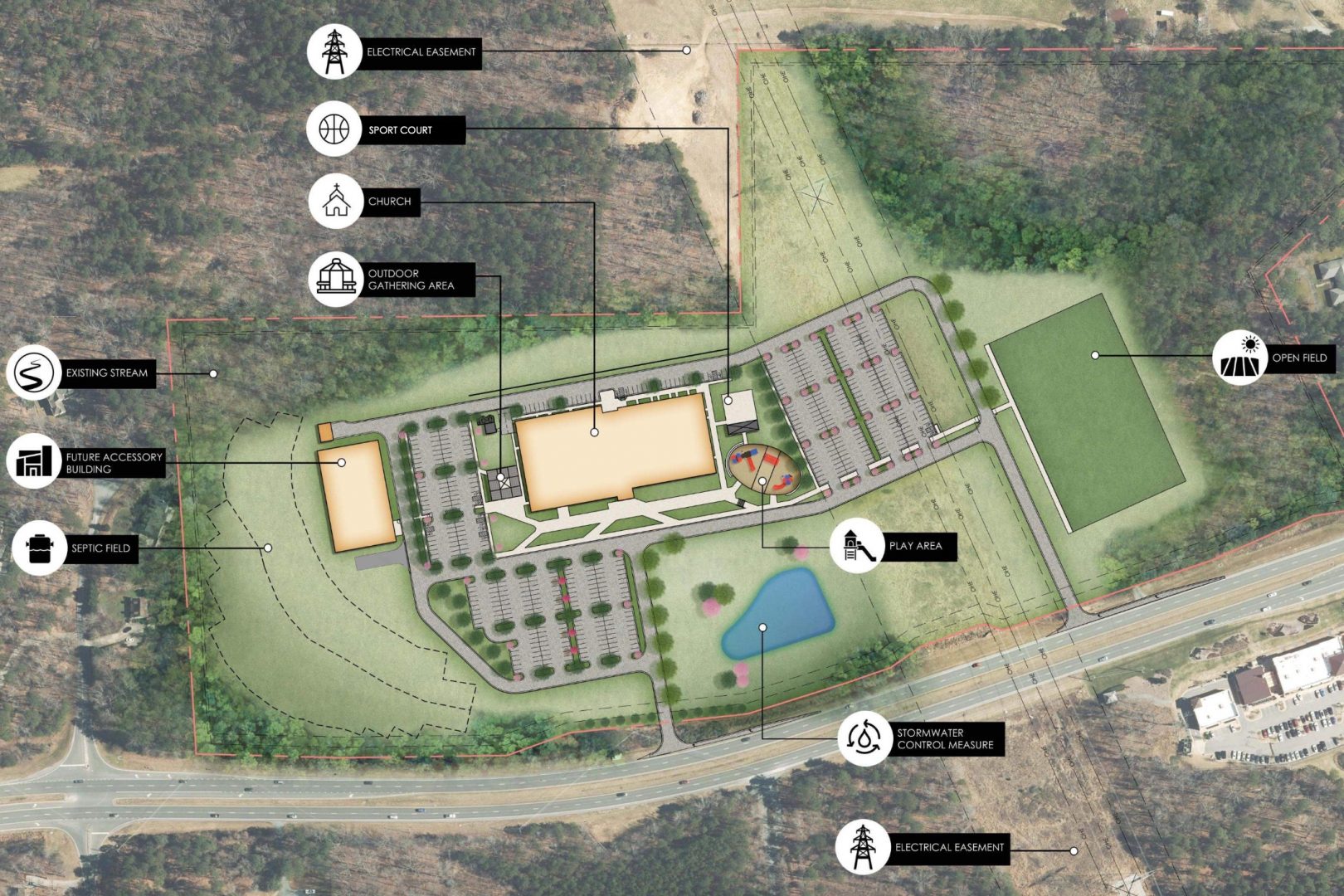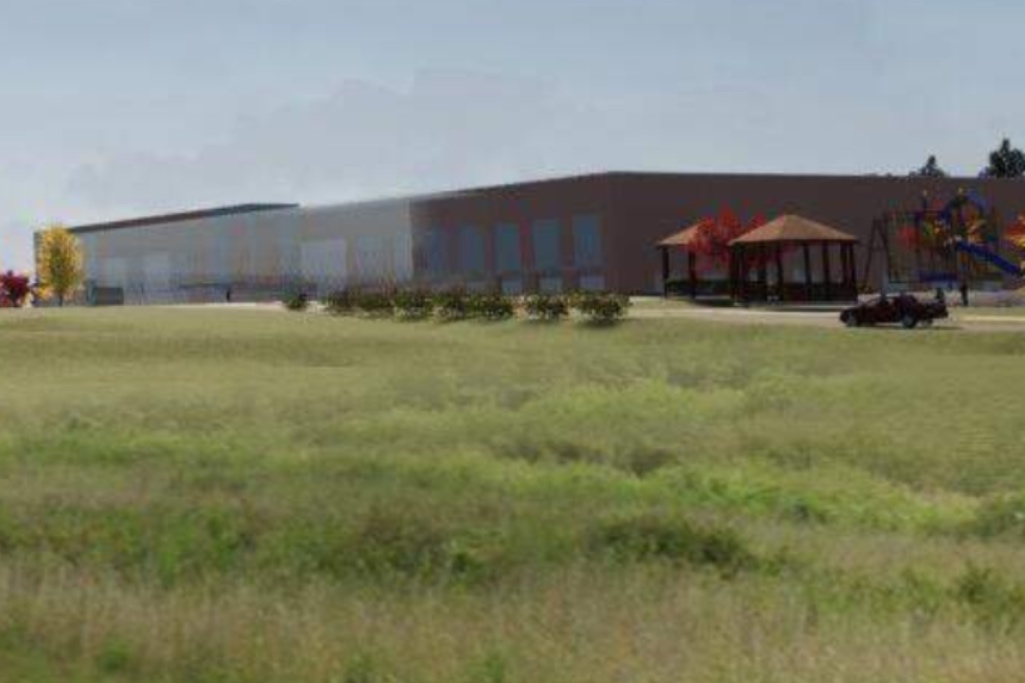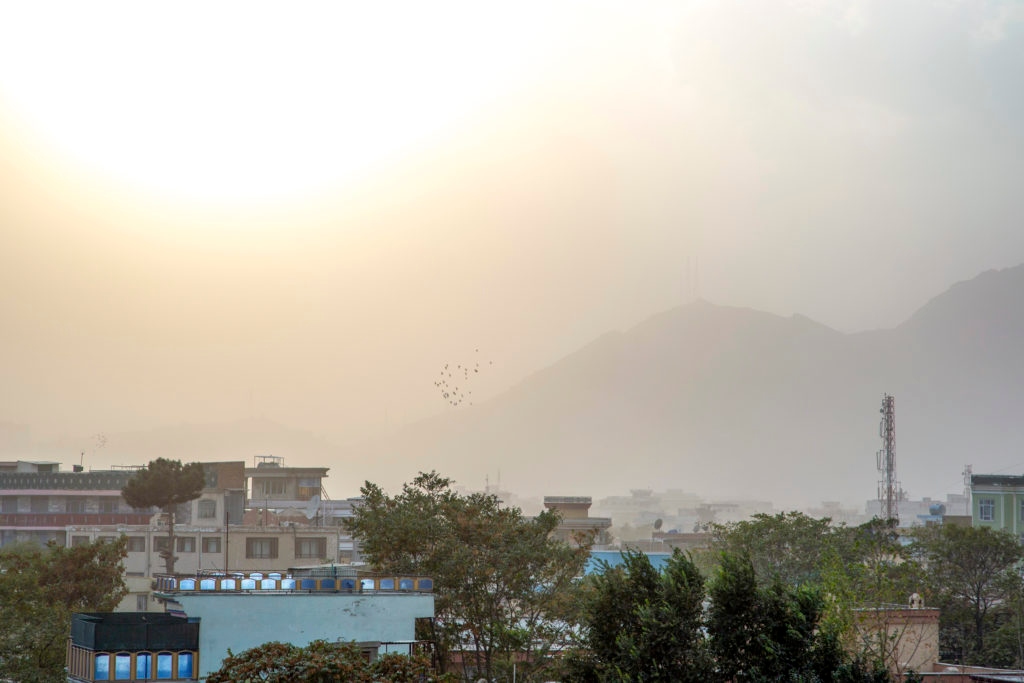
The site plan for The Summit Church’s proposed new campus in Chatham County, N.C., called for a two-story, 82,000 square-foot church. The county’s Board of Commissioners denied The Summit’s zoning request.
DURHAM, N.C. — The Summit Church has filed a federal lawsuit accusing a North Carolina county of denying a zoning request to build a church facility because of religious discrimination.
In the lawsuit filed Feb. 14 in the U.S. Middle District Court of North Carolina, The Summit Church alleges that the Chatham County Board of Commissioners violated provisions of the Religious Land Use and Institutionalized Persons Act (RLUIPA) of 2000, a federal law that protects individuals, houses of worship and other religious institutions from discrimination in zoning and landmarking laws.
The lawsuit stems from the Chatham County Board of Commissioners’ decision in December 2024 to deny The Summit Church’s request to rezone three parcels of land totalling approximately 50 acres to build a permanent location for its Chapel Hill campus, which currently meets in a local high school. The Summit Church is a multisite congregation with 13 campuses that meet in 12 different locations across the Triangle region of North Carolina. Two of the campuses meet in the same location.
In rendering its decision, the board said in a signed statement that The Summit Church’s request was not consistent with the county’s land conservation and development plan, and it would not provide diversity in tax revenue or high-quality jobs for the area.
However, attorneys for The Summit Church claim that the commissioners’ denial, along with the county’s land use regulations and policies, place a substantial burden on the church’s religious exercise, treat religious assemblies and institutions unequally, discriminate on the basis of religion, and place unreasonable limitations on religious assemblies, institutions and structures, which are all violations of RLUIPA.
In a statement to the Biblical Recorder, The Summit Church said it filed the lawsuit to defend its constitutional rights, as well as the rights of other churches.
“The Board of Commissioners unanimously rejected our rezoning request, claiming that we were too big, after previously approving large commercial and retail developments within approximately three miles of our proposed location,” The Summit’s statement said. “Their statements also made it clear that our church is not welcome at all in the County. We view this to be unjust and in violation of federal law, specifically the Religious Land Use and Institutionalized Persons Act (RLUIPA), and are appealing to the courts because we believe we have a responsibility to defend our constitutional rights and the rights of all churches, regardless of beliefs, size, or methodology.”
The lawsuit seeks an injunction against the county’s decision and would require the county to approve The Summit’s zoning request. According to the lawsuit’s summons, Chatham County officials have 21 days from the filing date to respond, which would be March 7.
Chatham County Attorney Bob Hagemann acknowledged the lawsuit and said in a statement provided by email that the allegations raised in the lawsuit do not represent the community.
“We are aware of and are reviewing the complaint,” Hagemann said. “As with any legal action, Chatham County will respond through normal legal processes. That said, we reject the notion that Chatham County is hostile to religious institutions and practices. On the contrary, the County respects and supports the right of its residents to freely hold and exercise their religious beliefs.”
In December 2023, The Summit Church acquired an interest to purchase six parcels of land totaling about 97 acres in northeast Chatham County that had previously been approved for the development of a multiuse, active-adult community before those plans fell through. The land is about 13 miles away from East Chapel Hill High School in neighboring Orange County, where The Summit’s Chapel Hill campus currently meets.
Prior to entering the purchase agreement, representatives from The Summit Church met with review staff representing each stage of Chatham County’s rezoning process around October 2023. During that meeting, the review staff expressed the opinion that The Summit’s project was consistent with the county’s land use plan, according to the lawsuit.
After meeting with the Chatham County Appearance Commission and holding a community meeting in April 2024, The Summit Church submitted a rezoning application to the Chatham County Planning Department in May 2024 that requested three of the six parcels of land totaling about 50 acres be approved for a church/place of worship. The Summit also submitted a second rezoning application requesting that the remaining three parcels be returned to a residential zoning designation because the church had no immediate plans to develop them.
During a public hearing on The Summit Church’s rezoning requests scheduled by the Planning Department on Aug. 19, 2024, Chatham County Zoning Administrator Angela Plummer told county commissioners that the Appearance Commission “was very happy with their proposed landscaping plan,” adding that the church “took special care” and was “sensitive” to views from the road and adjacent properties.
Jael Wagoner, a landscape architect representing The Summit, also told the commissioners that building plans “are trying to match some of the surrounding commercial [development] that is adjacent to the site to make sure it’s fitting in with what’s there.”

Architectural rendering of a proposed new campus location of The Summit Church in Chatham County, N.C. The county’s Board of Commissioners denied The Summit’s zoning request.
Following Plummer and Wagoner’s presentations, some commissioners raised questions about traffic, tax implications, preservation of rural character and where church attendees would be coming from. The Summit’s lawsuit says that the Aug. 19 public hearing was the first time any elected official or member of the county’s planning staff had publicly expressed any concern about the church’s rezoning request or consistency with land use plans.
“For me, this just seems like a really big, brand new megachurch looking for a place to go, and it feels like a really poor fit for what we are envisioning,” said Commissioner Karen Howard, who was serving as the board’s vice chair at the time. “It really does feel like something that is antithetical to real rural character preservation.”
Howard also expressed concern about people coming from outside Chatham County to worship.
“This definitely feels like a site that will accommodate overflow from somewhere else,” Howard said.
Mike Dasher, then chair of the Board of Commissioners, raised a question about tax status.
“If a church were the owner of all of that property, I’m assuming it would all be exempt then from property tax?” Dasher asked. “Is that true?”
Dasher went on to express concerns about the potential loss of tax revenue.
“My concerns are taking that out of potential economic activity and benefit to the county in that way in perpetuity,” Dasher said.
Following the public hearing, the Board of Commissioners referred the matter to the Chatham County Planning Board.
The Planning Board held two meetings — one on Sept. 3 and another on Oct. 1 — to consider a recommendation on The Summit’s rezoning request. Each meeting included presentations from the county zoning administrator, representatives from The Summit Church and time for public comments.
Before the Planning Board voted at the Sept. 3 meeting to table consideration of the zoning request until October, board member Tony Mayer said, in his opinion, there were “not any really clear reasons to object” to the measure, according to minutes from the meeting. However, during the Oct. 1 meeting, the Planning Board voted 8-0 to recommend denying The Summit’s zoning request to the Board of Commissioners.
Prior to the vote on the recommendation to deny the request, Planning Board member Eric Andrews noted that “a denial of rezoning based on lack of revenue could be discriminatory and a violation of the 1st Amendment,” according to minutes from the meeting.
While a number of public comments in opposition to the zoning request focused on concerns about traffic, taxes and maintaining rural character, some were also critical of The Summit Church.
One Chatham County resident wrote: “This county is known for its progressive, LGBTQ-friendly, and open-minded atmosphere, which is why many of us have chosen to call it home. Building a mega-church in this area runs contrary to these values, and many residents, including myself, are deeply concerned. A mega-church is not just a place of worship—it functions as a large-scale business, and it should be taxed and regulated as such.”
Another resident wrote: “The increased traffic congestion, environmental degradation, community disruption, potential tax hikes, and support for an organization with anti-LGBTQ+ views all pose significant risks to the area’s residents and their quality of life. This development is not in the best interests of the community.”
The Chatham County Board of Commissioners voted unanimously to deny The Summit’s rezoning request during a meeting held Dec. 16, 2024.
Prior to the vote, Howard, the Board of Commissioners’ former vice chair who now serves as chair, said Chatham County was not the place for a church the size of The Summit, which she referred to as a “megachurch.”
“This is not a disparagement to The Summit Church in not wanting a church of that size in that location in Chatham County,” Howard said, adding that “Chatham County is not a place to call home for that size of a church.”
According to records, The Summit Church’s proposal included plans for a two-story, 82,000 square-foot church building capable of seating 1,200 people, a one-story, 900 square-foot maintenance building and a future one-story accessory building totaling approximately 24,000 square feet. The plans also call for a children’s play area and a sports court.
The active-adult community previously approved for development on the site included plans for 161 residential units, a four-story, 140,000 square foot congregate care facility, a one-story, 10,000 square foot office/day care, a community garden and a barn for events.
The Summit’s lawsuit called Howard’s statements “troublesome.”
“Given the sprawling commercial development around the Property, the size of Summit’s building is clearly not the problem,” the suit says. “Larger developments line U.S. Highway 15-501 near the Property. Instead, the Board of Commissioners takes issue with building ‘that size of a church.’”
The suit adds that stated reasons for the denial — lack of tax revenue and high-quality jobs — “would apply to almost any house of worship.”
“That denial’s inconsistency with policy, procedure, and historical practice, combined with its apparent application to houses of worship, provides compelling evidence of religious discrimination,” the suit says.


